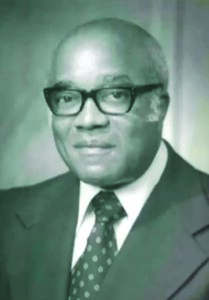Diversity was a theme of this year’s Triological Society Combined Sections Meeting, held in January in San Diego, Calif. It stood to reason, therefore, that the society’s middle section vice president, Dana M. Thompson, MD, MS, MBA, chose John H. Gladney, MD (1923–2011), to posthumously be her guest of honor for the meeting. “I thought it was important to honor a legacy who really helped me understand the importance of Trio—someone who was unique, and whose contribution tells a part of [the society’s] history that has been understated and not fully recognized,” said Dr. Thompson.
Explore This Issue
April 2022As the first African American to hold the position of chairperson of a basic science or clinical department in the United States, and the first African American physician admitted to the Triological Society, Dr. Gladney was a pioneer in the ongoing mission for diversity and equity in medicine. As a practitioner and educator for more than 50 years, he was a trailblazer in his personal and holistic approach to his patients and students. Together with his wife of close to 70 years, Agnes Clarice Gladney, MA, a speech pathologist, and their three children, he became an important force for racial equality and community-driven advocacy.
Dr. Gladney’s groundbreaking contributions in otolaryngology, education, and civil rights continue to reverberate throughout the medical community, in no small part thanks to the distinguished physician leaders who have applied Dr. Gladney’s influence on them to inspire a new and increasingly diverse generation of physicians.
Forging a Path
Born in Little Rock, Ark., John Gladney grew up in the 1920s and 1930s, attending segregated schools. As a boy, he witnessed the unsanitary conditions of the hospital in which his terminally ill mother was a patient, and the experience left a permanent impression as he set his sights on becoming a doctor. As a teenager, he demonstrated early leadership ability as his high school’s student body president. In 1939, he entered Talladega College in Alabama, that state’s oldest private historically African American liberal arts college. Serving honorably in the U.S. Army Specialized Training Program afforded Dr. Gladney the ability to attend Meharry Medical College in Nashville, the first medical school for African Americans in the South. He interned at the segregated Homer G. Phillips Hospital in St. Louis.
As a commissioned U.S. Army captain, Dr. Gladney was called to serve during the Korean War. “But there were people who objected to having an African American commander,” explained William R. Bond, Jr., MD, a Washington, D.C.-area private practice otolaryngologist currently on faculty at Howard University and Georgetown University, and Dr. Gladney’s former medical protégé and friend. He enlisted in the U.S. Air Force and was sent to French Morocco to serve. “Like my parents, John grew up in a segregated society, and had to make inroads in that society. Obviously, there were roadblocks thrown in his path.”
